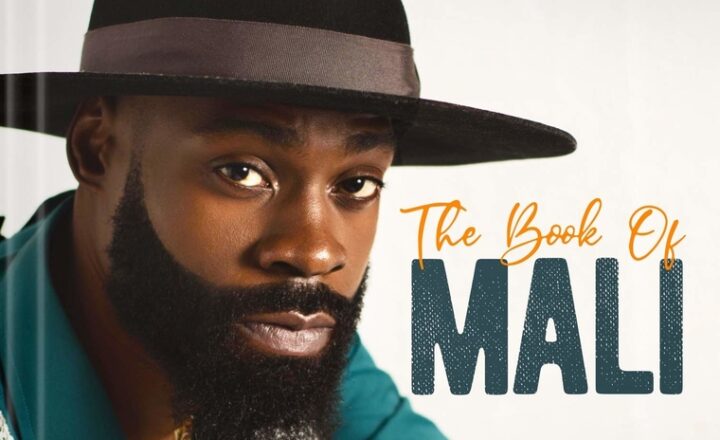Mali Music’s Powerful Lament

The Book of Mali
Mali Music
RCA Inspiration
Reviewed By JJT
The Book of Mali is the kind of album most adults should be listening to, whether they know it or not. On his fifth full-length LP, the genre-bending, multi-instrumentalist constructs a tapestry of sounds that come from somewhere deep, soulful, and true. As has always been the case with Mali, this Book refuses to stay within its pages, either musically or emotionally. It is simultaneously unsettling and encouraging, convicting, and hopeful. It tears certain things down with a clear heart oriented toward building something stronger in its place. I suspect The Book of Mali will be read differently by different audiences, but all should be turning its pages.
Mali Music dropped onto the music scene back in 2008 with an independent record called The Coming and followed it quickly in 2009 with The 2econd Coming. He blended elements of hip hop, soul, R&B, and Gospel into a gumbo music industry people dumped into a bucket called Urban Contemporary (or Urban Alternative in some cases.) In 2013 he won a “Rap/Hip Hop” Dove Award for a collaboration with Lecrae called “Tell The World.” In 2015 his album Mali Is was nominated for a Grammy Award for Best Urban Contemporary Album, the field where artists like Beyonce, Frank Ocean, Lizzo, and The Weeknd compete. (He lost to Pharrell Williams’ Girl.) That same year he was nominated for a Best Gospel Performance/Song Grammy for his track “I Believe” from that same album. After years of pressure, the Academy behind the Grammy Awards recently dropped that catch-all term and re-named it “Progressive R&B.” In 2018 Mali was nominated for both an NAACP Image Award, for his song “Gonna Be Alright,” and for a Best Traditional R&B Grammy for the song “Still.” Both of those tracks were from his acclaimed 2017 album The Transition of Mali. This year he returns with a record that continues to defy easy classification. But this is not the eclecticism of an undisciplined or overly experimental artist. As the nominations and awards from so many different sources and categories prove, Mali Music is truly excellent at each of these sounds. In many ways, he walks in the steps of Marvin Gaye, Donny Hathaway, or Prince.
The diversity found in The Book of Mali is not limited to its sound. Over the span of thirteen songs and a conversational intro track, the artist explores some extremely vulnerable and sophisticated lyrical territory. Depression, isolation, and desperation are his starting point. The first track, “Blessed,” brilliantly upends one of the most common Church cliches in the book. Over a smooth trap beat, and with a looped sample of some church sister asking, “Is anybody in here blessed?” Mali listlessly responds, “I’m blessed,” before dissecting simple answers to complicated questions. Got questions? Ask Christ. Got needs? Ask Christ. Live in favor, be a king, etc. and so forth. Lines like “Pull up like an Uber Hallelujah, any kind of music that will move ya” are just too good. An “Uber Hallelujah?” Convenient, quick, fast, but it’s not yours. You don’t own it and the driver probably doesn’t care about you at all. In the end none of the answers sound personal. None of them sound satisfying. The song ends with a sample of someone saying “God is good, it’s true. Just like the statement, ‘the sky is blue.’” Dang! The sky only looks like its blue, right? It’s an illusion. And this is the opening track!
“Let Go,” crafts an irresistible cascade of R&B layers that Hathaway would love, and then uses it as a backdrop for an old school rap. It dives deeper into depression, addiction, and even a longing to end it all. The textures are warm, the harmonies are hypnotizing, and the lyrics are devastating.
Right in my way gotta pass it…
It’s right in my way as I pass…
Right at the bar so I glass it.
It’s a classic attack.
Like an addict,
All of the time gotta have it.
It’s right in my way as I pass…
Right for the altar to cast it
On the shoulders of my lord…
And then, after a scratchy audio clip of the artist describing his desire to bring down a pillar of fire, a la Elijah, he moves right into a song that features his voice and acoustic guitar and needs absolutely nothing else. “Cry” is a ballad of lament that growls and soars, and invites the listener to let whatever it is that we have laid on the altar, or maybe whatever false altars we have set up to compete with God, to burn. There’s mourning, and freedom, in those flames. They sting, but they don’t kill. It’s an unbelievably powerful song. And the performance deserves special attention. Mali comes careening in with a scorching electric guitar solo at the end of the track – Hendrix, or Gary Clark Jr., are now in the room, calling down fire.
“Mo’Lo (Like You)” finds the artists still down in the pit of humility, like Elijah was right after his throwdown with those false priests. But he recognizes Jesus down there with him. Instead of rushing back to a mountaintop, he takes time to contemplate the fraternity that pain brings with the Man of Sorrows. In this moment we sense a transition. “My Blessings (Love Me)” revisits the cliché from the opening track, but imbues it with new meaning born of suffering. There’s a lift happening. There’s fresh air in his lungs.
Then we move into the middle section of the set. “Apologize” is the kind of track Janelle Monae fans need to hear. Yes, it’s a Gospel song, but it is both stylistically progressive, theologically rich, and artistically evocative. Plus, it is just a wickedly cool track. “Yin and Yang” moves gently into more ambient pop, while “World Record” pulls the rope back into alternative sounds. “Soul Seeking” is a cruising, deep grooving, funk-based jam – from the instrument sounds to Mali’s deeply human sounding vocals, this is a track hip hop and alternative rap fans will repeat over and over. “All Night” takes us deep into classic soul territory via a sample, before deconstructing everything into a completely winning mash-up of progressive R&B and hip hop.
As we move toward the end of the album, tracks like “Soul Seeking,” “All Night,” “Lord’s Will,” and “Lord Forgive Me” (a Gospel worship confessional song that should be sung in churches this week,) clearly transition from the darker tones of the album’s opening to something decidedly more hopeful. (Younger artists should notice the way Mali earns the right offer up church songs like these, by first meeting his audience in their pain.)
But brace yourselves for the closing track. “This Way (Say I Love You)” features an emotionally stirring poem recited by its author, Aniyah Smith. It’s a plea to anyone considering suicide to “write me a survivor’s story.” The theme of depression is thus revisited, addressed, and resolved without anything resembling a cliché or a simple answer.
The thing many don’t understand about depression is that it is often not experienced as a pervasive feeling of sadness. The most common expression of depression is an inability to feel anything at all. It’s numbness. It’s the inability to feel pleasure or pain that ultimately causes many depressed people to engage in self-harm. Human beings are designed to feel. Numbness is excruciating. We would rather feel pain than nothing at all. Mali artfully leaves the sources of his struggles just out of view. This allows listeners to relate to the emotions, without having to identify with the circumstances. Thus anyone dealing with pain, frustration, doubt, fear, or depression, can enter into this aural journey and find a compassionate tour guide as their companion.
The Book of Mali is a stunning album. For some, it may be the kind of art that allows them to express things they haven’t previously been able to get in touch with. It may be a cathartic experience for certain pilgrims who are feeling particularly weary on their path. For others, though, it provides a much-needed opportunity to practice empathy. With music that skillfully references both modern and timeless sounds from the Black community, and emotions that are all-too-familiar for our brothers and sisters in the persecuted Church, Mali has offered up a true blessing with his Book.




